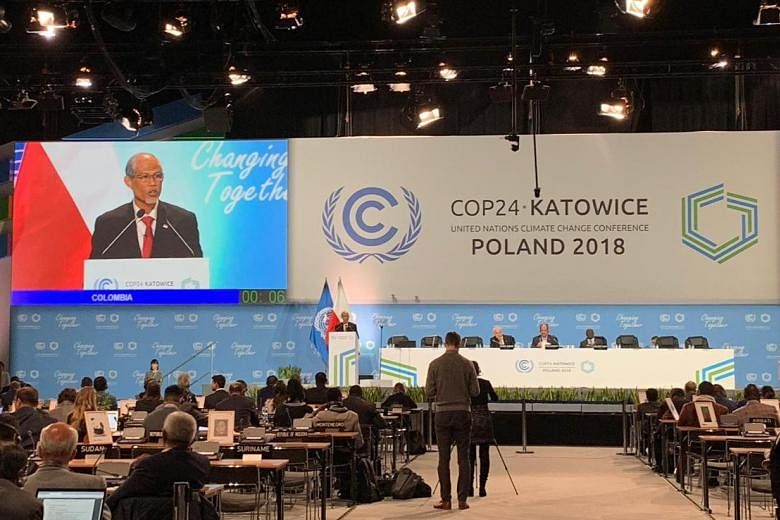KATOWICE, POLAND - A strong, unequivocal signal that the world is united against climate change - that is Singapore's expected outcome from COP24, the ongoing United Nations climate talks in Katowice, Poland.
In delivering Singapore's national statement on Wednesday (Dec 12), Mr Masagos Zulkifli, Singapore's Minister for the Environment and Water Resources, told delegates: "At a time when multilateralism is being challenged, COP24 will be a key test of the multilateral system to deliver an effective response to the climate.
"COP24 must send a strong and unequivocal signal that the world is united in advancing global climate action."
To this end, a credible, durable and pragmatic set of rules - the Katowice Rulebook - should be developed to guide countries on how their climate targets can be reached, Mr Masagos said, urging negotiators to "stay faithful to the principles and political balance achieved under the Paris Agreement".
The climate talks in Katowice in Poland aim to agree on a rulebook that will allow the historic Paris Agreement, drawn up at COP21 in 2015, to go into force by 2020. Nations were set a three-year deadline to agree on the complex set of rules.
But a few sticking points - or "crunchy points", as the Polish president for COP24 Michal Kurtyka has referred to them - have hampered progress.
One of them is the issue of differentiation - whether obligations between developed and developing countries should be different due to varying capabilities. Currently, developed and developing countries have different transparency mechanisms for the measurement, reporting and verification of emissions data. But under the Paris Agreement, all parties could be subject to the same requirements, with developing countries getting the necessary support, in terms of finance and additional time, for example.
On Wednesday, Mr Masagos emphasised that the outcome at the Poland talks had to drive urgent climate action by all countries.
He acknowledged that developing countries were starting out on their climate action journey from a different position from the developed nations, and that adequate support had to be given to these countries to support their implementation of the Rulebook.
This includes, for example, financing their climate mitigation plans, or helping them improve their adaptation planning and management of climate change-related disaster risks.
The Katowice climate talks are taking place against a backdrop of weather disasters and scientific reports which underscore the urgency to cut planet-warming greenhouse gas emissions that are fuelling more damaging storms, droughts, floods and deadlier heatwaves.
An October report by the Intergovernmental Panel on Climate Change (IPCC), for example, had looked at the impacts of 1.5 deg C global warming versus 2 deg C. It found that any warming exceeding 1.5 deg C could condemn economies and ecosystems to deadlier weather extremes, habitat loss, falling crop yields and ever higher sea levels.
Said Mr Masagos: "Singapore is one of these low-lying island states that is vulnerable to sea-level rise and severe floods from intense storms. Clearly, we need urgent, collective and coordinated efforts by all."
Singapore is doing its part, despite contributing just 0.11 per cent of global emissions, he added. Regionally, for example, Singapore has convened a number of meetings with fellow Asean members to discuss climate change, and is also supporting the South-east Asia Disaster Risk Insurance Facility, to address the rising natural catastrophe protection gap in the region.
At home, Singapore is promoting energy efficiency, and will roll out a carbon tax next year to force large emitters to pollute less, said Mr Masagos. It has also made "significant and costly infrastructure investments" to protect the country from the effects of climate change, such as raising the height of coastal roads and new buildings, and enhancing our drainage and flood managements systems.
In closing, Mr Masagos emphasised Singapore's position as being an advocate of a multilateral, rules-based approach to addressing climate change.
He said: "The Paris Agreement was a hard-fought agreement forged through the unity of purpose of all parties. We must leave Katowice with a credible, durable and pragmatic rulebook that enables all to implement the Paris Agreement in good faith."


